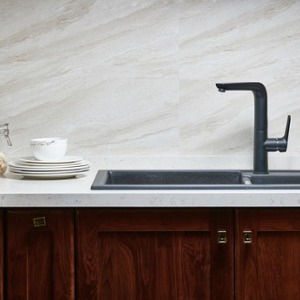Just How Durable are Porcelain Countertops?

If you’re interested in using porcelain for the countertops in your home, you might be curious about whether your surfaces will mimic the polished white of your sink. In reality, the advanced production technologies used to create this material can ensure that you have access to an endless array of colors and patterns for your porcelain. You can even pick styles that look incredibly similar to natural stone, such as marble and granite.
With plenty of natural or bold color choices, options for veining and luminescent flecks, and polished or unpolished finishes, you’ll have no trouble selecting the ideal countertop to match your needs.
But you also need a countertop surface that’s going to stand up to the lifestyle needs of your household. Is porcelain really up to the task for busy, high traffic kitchens? How does it compare to other stone surfaces, like marble, granite, or engineered quartz? Just how durable are porcelain countertops?
Here’s what you should know before selecting the ideal porcelain countertops for your home.
How Porcelain is Made
As you may know, natural stone like marble, granite, and quartzite can be quarried around the world. Slabs of local stone are cut and then shipped to a variety of destinations. Even engineered quartz is made from over 90% quartz dust that is mixed with resins and polymers for binding.
Porcelain is a little different. Although it is also an engineered product, porcelain countertops are made from kaolinite clay, which contains elements like silica, mineral oxides, and feldspars, which gives the surface its incredible strength.
What really gives porcelain its astonishing hardness, though, is how it’s processed. Once it has been fabricated, it is baked at temperatures up to 2,500 degrees, just like clay pots or mugs are fired in a kiln. Once porcelain slabs cool, the result is a hard, compact surface that is resistant to all kinds of damage.
The only caveat here is that porcelain is extremely delicate during the fabrication process. This is why it’s important to find a qualified fabricator and installer that’s experienced in working with the delicate nature of this stone. Once it’s in place, however, you’ll find that it’s extremely difficult to damage this durable surface!
The Hardness of Porcelain Countertop Surfaces
Let’s look at how porcelain stacks up against other countertop surfaces when it comes to hardness. Consider that marble ranks at about 3-5 on the MOHs hardness scale, while granite comes in at 6-7 and quartzite and engineered quartz come in around 7.
Porcelain can have a hardness rating up to 30% higher than granite, coming in at roughly 7-9. Don’t forget that diamonds, the hardest substance on Earth, are the only material to rank at the peak hardness of 10.
Because of this, porcelain is exceedingly resilient. It’s resistant to chips, cracks, scratches, and abrasions that could mar other countertop surfaces. In addition, no sealing is required for porcelain surfaces, which means that you never have to worry about resealing it after it’s installed. The surface is as strong as the day you install it.
Other Benefits of Porcelain Countertops
In addition to offering outstanding strength and durability, porcelain delivers a range of benefits that homeowners are sure to love. The material is nonporous, which means it doesn’t readily absorb liquids. It is an antimicrobial, food-safe surface that is resistant to staining from food, chemicals, and more.
It’s also resistant to etching and dullness that comes from chemicals or other acidic substances, which means that you can clean it with practically any general household cleaning product.
Porcelain is also good for indoor and outdoor use. Because it’s resistant to heat, frost, and UV rays, it’s a great option for your household kitchen and your exterior kitchen counters.
What might really surprise you, though, is how thin and lightweight porcelain countertops are. Because of this, slabs can not only cover expansive surfaces like large kitchen islands, but they can also be used for vertical installations, like backsplashes or entire wall surfaces.
Even better, you can opt for a single surface that is larger than the average stone slab, helping to minimize or even eliminate seams for counter surfaces, including large islands. If your project does require a seam, advanced inkjet production means that you can transition patterns seamlessly from one slab to the next.
There’s no denying the benefits of modern porcelain countertops for use throughout your home. When you’re looking for a durable product that will stand the test of time, it’s hard to argue with the hardness and resilience of porcelain.
Need help?
Academy Marble & Granite’s team is ready to help you with your home project. Schedule a consultation at one of our locations today.


